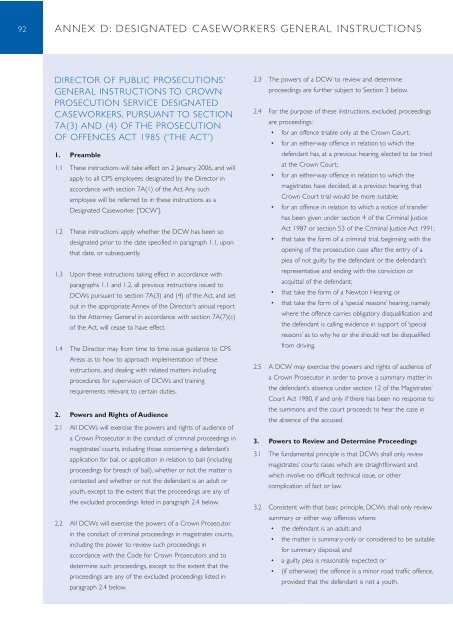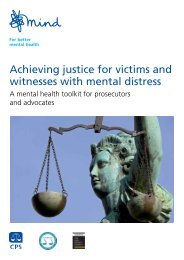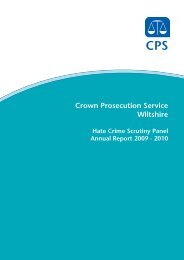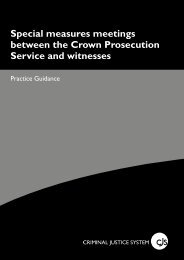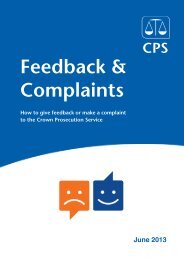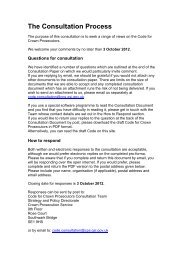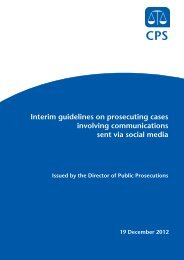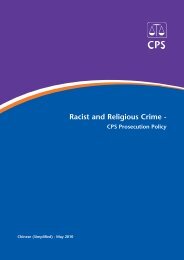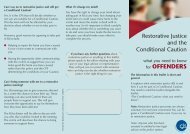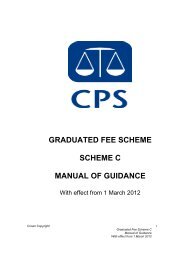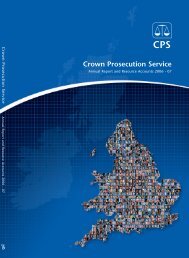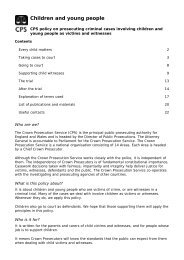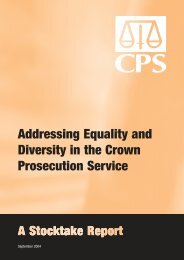CPS Annual Report 2005-2006 - PDF - Crown Prosecution Service
CPS Annual Report 2005-2006 - PDF - Crown Prosecution Service
CPS Annual Report 2005-2006 - PDF - Crown Prosecution Service
Create successful ePaper yourself
Turn your PDF publications into a flip-book with our unique Google optimized e-Paper software.
92<br />
ANNEX D: DESIGNATED CASEWORKERS GENERAL INSTRUCTIONS<br />
DIRECTOR OF PUBLIC PROSECUTIONS’<br />
GENERAL INSTRUCTIONS TO CROWN<br />
PROSECUTION SERVICE DESIGNATED<br />
CASEWORKERS, PURSUANT TO SECTION<br />
7A(3) AND (4) OF THE PROSECUTION<br />
OF OFFENCES ACT 1985 (‘THE ACT’)<br />
1. Preamble<br />
1.1 These instructions will take effect on 2 January <strong>2006</strong>, and will<br />
apply to all <strong>CPS</strong> employees designated by the Director in<br />
accordance with section 7A(1) of the Act. Any such<br />
employee will be referred to in these instructions as a<br />
Designated Caseworker [‘DCW’].<br />
1.2 These instructions apply whether the DCW has been so<br />
designated prior to the date specified in paragraph 1.1, upon<br />
that date, or subsequently.<br />
1.3 Upon these instructions taking effect in accordance with<br />
paragraphs 1.1 and 1.2, all previous instructions issued to<br />
DCWs pursuant to section 7A(3) and (4) of the Act, and set<br />
out in the appropriate Annex of the Director’s annual report<br />
to the Attorney General in accordance with section 7A(7)(c)<br />
of the Act, will cease to have effect.<br />
1.4 The Director may from time to time issue guidance to <strong>CPS</strong><br />
Areas as to how to approach implementation of these<br />
instructions, and dealing with related matters including<br />
procedures for supervision of DCWs and training<br />
requirements relevant to certain duties.<br />
2. Powers and Rights of Audience<br />
2.1 All DCWs will exercise the powers and rights of audience of<br />
a <strong>Crown</strong> Prosecutor in the conduct of criminal proceedings in<br />
magistrates’ courts, including those concerning a defendant’s<br />
application for bail, or application in relation to bail (including<br />
proceedings for breach of bail), whether or not the matter is<br />
contested and whether or not the defendant is an adult or<br />
youth, except to the extent that the proceedings are any of<br />
the excluded proceedings listed in paragraph 2.4 below.<br />
2.2 All DCWs will exercise the powers of a <strong>Crown</strong> Prosecutor<br />
in the conduct of criminal proceedings in magistrates courts,<br />
including the power to review such proceedings in<br />
accordance with the Code for <strong>Crown</strong> Prosecutors and to<br />
determine such proceedings, except to the extent that the<br />
proceedings are any of the excluded proceedings listed in<br />
paragraph 2.4 below.<br />
2.3 The powers of a DCW to review and determine<br />
proceedings are further subject to Section 3 below.<br />
2.4 For the purpose of these instructions, excluded proceedings<br />
are proceedings:<br />
• for an offence triable only at the <strong>Crown</strong> Court;<br />
• for an either-way offence in relation to which the<br />
defendant has, at a previous hearing, elected to be tried<br />
at the <strong>Crown</strong> Court;<br />
• for an either-way offence in relation to which the<br />
magistrates have decided, at a previous hearing, that<br />
<strong>Crown</strong> Court trial would be more suitable;<br />
• for an offence in relation to which a notice of transfer<br />
has been given under section 4 of the Criminal Justice<br />
Act 1987 or section 53 of the Criminal Justice Act 1991;<br />
• that take the form of a criminal trial, beginning with the<br />
opening of the prosecution case after the entry of a<br />
plea of not guilty by the defendant or the defendant’s<br />
representative and ending with the conviction or<br />
acquittal of the defendant;<br />
• that take the form of a Newton Hearing; or<br />
• that take the form of a ‘special reasons’ hearing, namely<br />
where the offence carries obligatory disqualification and<br />
the defendant is calling evidence in support of ‘special<br />
reasons’ as to why he or she should not be disqualified<br />
from driving.<br />
2.5 A DCW may exercise the powers and rights of audience of<br />
a <strong>Crown</strong> Prosecutor in order to prove a summary matter in<br />
the defendant’s absence under section 12 of the Magistrates’<br />
Court Act 1980, if and only if there has been no response to<br />
the summons and the court proceeds to hear the case in<br />
the absence of the accused.<br />
3. Powers to Review and Determine Proceedings<br />
3.1 The fundamental principle is that DCWs shall only review<br />
magistrates’ courts cases which are straightforward and<br />
which involve no difficult technical issue, or other<br />
complication of fact or law.<br />
3.2 Consistent with that basic principle, DCWs shall only review<br />
summary or either way offences where:<br />
• the defendant is an adult; and<br />
• the matter is summary-only or considered to be suitable<br />
for summary disposal; and<br />
• a guilty plea is reasonably expected; or<br />
• (if otherwise) the offence is a minor road traffic offence,<br />
provided that the defendant is not a youth.


